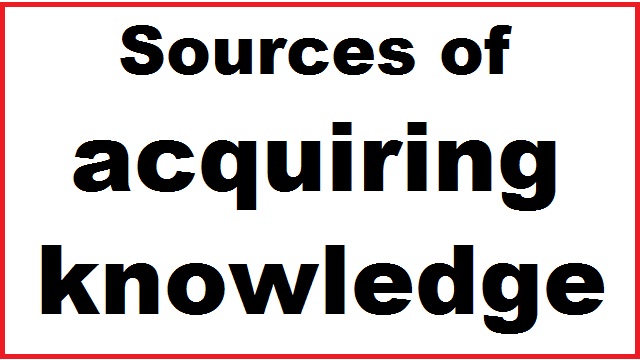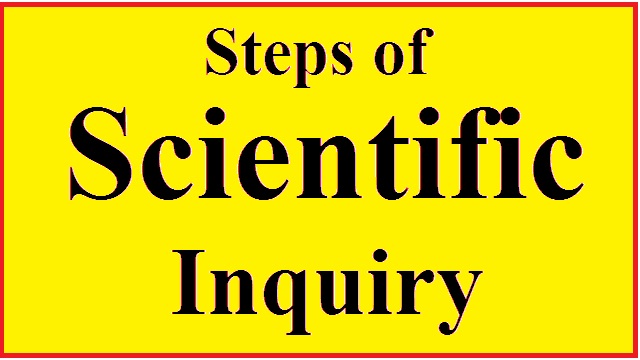Sources of acquiring knowledge
Sources of acquiring knowledge
Sources of acquiring knowledge : Knowledge can be used to mean a variety of things, such as familiarity with people, places, persons, skills, and competences of performing various tasks, beliefs, faiths and everyday experiences (Truncellito, 2007). One way of understanding the concept of knowledge is to look at the different ways in which we acquire knowledge.
Philosophers have traditionally maintained that there are two types of knowledge from two entirely different sources. First, there is knowledge through experience: seeing something, hearing about something, feeling something. This goes by the Latin term “posteriori” which literally means knowledge that is posterior to – or after experience. Second, there is knowledge that does not come from experience, but perhaps instead is intuitively supplied from reason itself, such as logical and mathematical truths. This is called a “priori” knowledge, which, from Latin, literally means knowledge that is prior to experience.
There are many ways to gain knowledge, and some are better than others. As at several ways of acquiring knowledge, beginning with sources that may not be as reliable or accurate as scientists might desire. Therefore, various sources will be considered that offer greater reliability and ultimately discuss using science as a means of gaining knowledge. The different sources are discussed below:
1. Intuition (Knowledge gained without being consciously aware of its source)
When we gain knowledge via intuition, it means that we haveknowledge of something without being consciously aware of where theknowledge came from. We have probably heard people say things like “Idon’t know, it’s just a gut feeling” or “I don’t know, it just came to me,and I know it’s true.” These statements represent examples of intuition.Sometimes we intuit something based not on a “gut feeling” but on eventswe have observed. The problem is that the events may be misinterpretedand not representative of all events in that category. For example, manypeople believe that more babies are born during a full moon or thatcouples who have adopted a baby are more likely to conceive after theadoption. These are examples of illusory correlation—the perception of arelationship that does not exist. More babies are not born when the moonis full, nor are couples more likely to conceive after adopting (Gilovich,1991). Instead, we are more likely to notice and pay attention to thosecouples who conceive after adopting, and not notice those who did notconceive after adopting.
2. Authority (Knowledge gained from those viewed as authority figures)
When we accept what a respected or famous person tells us, we are gainingknowledge via authority. We may have gained much of our own knowledgethrough authority figures. As we were growing up, our parentsprovided us with information that, for the most part, we did not question,especially when we were very young. we believed that they knew whatthey were talking about, and thus we accepted the answers they gave us.Mostpeople tend to accept information imparted by those they view as authorityfigures. Historically, authority figures have been a primary means ofinformation. For example, in some time periods and cultures, the churchand its leaders were responsible for providing much of the knowledge thatindividuals gained throughout the course of their lives.Even today, many individuals gain much of their knowledge from authorityfigures. This may not be a problem if the perceived authority figure truly isan authority on the subject. However, problems may arise in situations wherethe perceived authority figure really is not knowledgeable about the materialhe or she is imparting. A good example is the information given in “infomercials.”Celebrities are often used to deliver the message or a testimonial concerninga product. For example, Kareena Kapoor may tell us about a makeupproduct. Does Kareena Kapoor have a degree in dermatology? This individualmay be experts on acting or modelling, but they are not authorities on the productsthey are advertising. Yet many individuals readily accept what they say.In conclusion, accepting the word of an authority figure may be a reliableand valid means of gaining knowledge, but only if the individual istruly an authority on the subject. Thus, we need to question “authoritative”sources of knowledge and develop an attitude of scepticism so that we donot blindly accept whatever is presented to us.
3. Rationalism (Knowledge gained through logical reasoning)
Gaining knowledge via rationalism involves logical reasoning. With thisapproach, ideas are precisely stated and logical rules are applied to arrive ata logically sound conclusion. Rational ideas are often presented in the formof a syllogism. For example:
All humans are mortal;
I am a human;
Therefore, I am mortal.
This conclusion is logically derived from the major and minor premisesin the syllogism. Consider, however, the following syllogism:
Attractive people are good;
Hritwik is attractive;
Therefore, Hritwik is good.
This syllogism should identify for us the problem with gaining knowledgeby logic. Although the syllogism is logically sound, the content of bothpremises is not necessarily true. If the content of the premises were true, thenthe conclusion would be true in addition to being logically sound. However,if the content of either of the premises is false (as is the premise “Attractivepeople are good”), then the conclusion is logically valid but empirically falseand therefore of no use to a scientist. Logic deals with only the form of thesyllogism and not its content. Obviously, researchers are interested in bothform and content.
4. Empiricism
Knowledge via empiricism involves gaining knowledge through objectiveobservation and the experiences of our senses. An individual who says “Ibelieve nothing until I see it with my own eyes” is an empiricist. The empiricistgains knowledge by seeing, hearing, tasting, smelling, and touching.This method dates back to the age of Aristotle. Aristotle was an empiricistwho made observations about the world in order to know it better. Plato, incontrast, preferred to theorize about the true nature of the world withoutgathering any data.
Empiricism alone is not enough, however. Empiricism represents a collectionof facts. If, as scientists, we relied solely on empiricism, we would havenothing more than a long list of observations or facts. For these facts to be useful,we need to organize them, think about them, draw meaning from them,and use them to make predictions. In other words, we need to use rationalismtogether with empiricism to make sure that we are being logical about theobservations that we make. As we will see, this is what science does.
5. Scientific method
Gaining knowledge via science, then, involves a merger of rationalismand empiricism. Scientists collect data (make empirical observations)and test hypotheses with these data (assess them using rationalism). Ahypothesis is a prediction regarding the outcome of a study. This predictionconcerns the potential relationship between at least two variables (a variableis an event or behavior that has at least two values). Hypotheses are statedin such a way that they are testable. By merging rationalism and empiricism,we have the advantage of using a logical argument based on observation.We may find that our hypothesis is not supported, and thus we have tore-evaluate our position. On the other hand, our observations may supportthe hypothesis being tested.
In science, the goal of testing hypotheses is to arrive at or test a theory- an organized system of assumptions and principles that attempts to explaincertain phenomena and how they are related. Theories help us to organizeand explain the data gathered in research studies. In other words, theoriesallow us to develop a framework regarding the facts in a certain area. Forexample, Darwin’s theory organizes and explains facts related to evolution.To develop his theory, Darwin tested many hypotheses. In addition to helpingus organize and explain facts, theories help in producing new knowledgeby steering researchers toward specific observations of the world.
Students are sometimes confused about the difference between a hypothesisand a theory. A hypothesis is a prediction regarding the outcome of asingle study. Many hypotheses may be tested and several research studiesconducted before a comprehensive theory on a topic is put forth. Once atheory is developed, it may aid in generating future hypotheses. In otherwords, researchers may have additional questions regarding the theorythat help them to generate new hypotheses to test. If the results from theseadditional studies further support the theory, we are likely to have greaterconfidence in the theory. However, further research can also expose weaknessesin a theory that may lead to future revisions of the theory.
In the conclusion, I tabulate all the sources of knowledge with their advantage and disadvantage in Table 1.
Table 1: The different Sources of Knowledge
| Sources | Description | Advantage/Disadvantages |
| Intuition | Gaining knowledge without being consciously aware of where the knowledge came from | Not empirical or logical |
| Authority | Gaining knowledge from those viewed as authority figure | Not empirical or logical; authority figures may not be an expert in the area |
| Rationalism | Gaining knowledge through logical reasoning | Logical but not empirical |
| Empiricism | Gaining knowledge through observations oforganisms and events in the real world | Empirical but not necessarily logical or systematic |
| Scientific method | Gaining knowledge through empirical methods and logical reasoning | The only acceptable way for researchers/ scientists to gain knowledge |
References:
http://www.jsu.edu/depart/psychology/sebac/fac-sch/rm/pdfs/Ch4v4.pdf
https://ibave.weebly.com/uploads/1/0/7/4/10741354/applied_research_ibave1.pdf
Name: DHIMAN CHOWDHURY
Class: M.Ed (Sem-1); Roll No: 2
Course name: Methodology of Educational Research (MED-214)
Vinaya Bhavana, Department of Education
Visva-Bharati University, Shantiniketan
West Bengal




Comments
Post a Comment